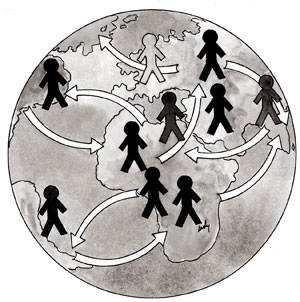|
Cities and climate changes:
Human settlements and shelter for all
Seetha KODAGODA
Since 1985, the United Nations has been celebrating ‘World Habitat
Day’ on the first Monday of October, of each year to focus attention on
the state of human settlements and the basic right to adequate shelter
for all has been celebrated on several themes by the UN habitat. ‘World
Habitat Day’ this year will be celebrated on the theme of ‘Cities and
Climate Changes’. The United Nations has chosen this theme to raise
awareness on quality of human settlements.
Hence climate changes have directly resulted in environmental changes
in various countries and we can see a real movement of a environmental
sense. So, I am willing to focus on this paper to the point of view
‘Human face of the urban environment.’
 There
is little doubt that a rapidly growing share of the world’s population
is living in urban areas. Urban areas are thus both consumers and
producers and have become the engines of economic development. And yet
they also contribute to the pollution of the natural environment. Cities
have their own special problems that have produced new environmental
phenomena and behaviour. Mountains of solid waste, rivers that burn and
air quality that can lead to brain damage and loss of human
intelligence. There
is little doubt that a rapidly growing share of the world’s population
is living in urban areas. Urban areas are thus both consumers and
producers and have become the engines of economic development. And yet
they also contribute to the pollution of the natural environment. Cities
have their own special problems that have produced new environmental
phenomena and behaviour. Mountains of solid waste, rivers that burn and
air quality that can lead to brain damage and loss of human
intelligence.
Urban dwellings
We have also learned that these problems have disproportionately
large impacts on the urban poor. Housing policies that force the poor
into un-served squatter settlements keep people poor by denying them the
opportunity to use their physical environment. The result is that only
40 percent of urban dwellings are connected to sewers, inadequate water
supply forces the poor to pay higher prices for water, of 10 to 15
litres what middle income householders pay per litre of portable water.
A lack of effective sanitation and waste disposal polluters, shallow
aquifers, which other poor residents use as water resources. Middle and
upper income groups are able to afford solutions to these problems, the
poor are forced with these additional burdens.
Let me try to identify the critical features of the human face of the
urban environment, why is the challenge of the urban environment a human
problem? Because the manner in which people have organized themselves,
has important consequences for environmental resources. As increasingly
shares of national populations are found in urban areas, their
consumption patterns become more significant.
When we speak of the vulnerability of urban areas to environmental
disasters, it is not because Sri Lanka cities receive a higher rainfall
than the countryside and thus are susceptible to flooding. It is rather
that concentrations of people in urban areas may have constructed
infrastructure to manage run off that cannot be maintained, thus leading
to flooding of the banks of drainage canals. This so-called ‘natural
disaster.’ Therefore, may be “natural only in the sense that it is a
commonly understood part of the human experience.”
Natural resources
Are cities sustainable? The question itself must be broken down.
First are cities living within reasonable resource limits? We know, for
example that there are cities and towns in India consuming dangerously
unsustainable quantities of natural resources. The question is not
whether cities are sustainable but rather “what needs to be done to
improve their sustainabilities?” We must look at examples of best
practice from around the world to learn what policies and approaches
have allowed some cities to be successful in managing environmental
resources.
Finally, crucial to all these questions is the issue of urban
environmental governance. Does pre-occupation with environmental
degradation imply a new set of challenges for urban environment? How
will mayor and other public officials deal with the environmental
problems their cities are now facing?
These questions suggest that we are at the beginning of an existing
intellectual journey on the subject of the world’s urban environment.
The improving the quality of life for the urban residents, the frontier
and be proactive in radically changing the ways things are done. This
will involve broadening the dialogue and cooperation involved in the
design, preparation and appraisal of urban environmental projects,
increasing the institution’s allocation of staff to the urban
environmental sector and providing increased assistance to countries in
establishing National Environmental Action Plans.
Human agendas
To work with local and national governments, NGOs and other
professional groups to establish explicit objectives for improved
performance and to develop clear indications of success for urban
environmental projects.
The world has come to understand that global and local, national and
regional, rural and urban eco-system and environmental conditions are
all connected, that all of us are downwind and upstream from one
another. The urban environmental agenda used to be considered largely a
set of local problems. Today, the world community is consumed with
revisiting and renegotiating the human agendas. Increasingly these
agendas require critical attentions to the human and environmental
conditions in cities and towns of all sizes and poverty, urban poverty
is inextricably part of the problems.
Key points of the environmental management in Sri Lanka:
*Promote geographically balanced settlement structures
*Manage supply and demands for water is any effective manner
* Effective and environmentally sound transportation systems
* Mechanisms to prepare and implement local environmental plans and
local agenda 21 initiatives
*Urban population
*Disasters and rebuild settlements
The writer is a
Senior Manager (NHDA), Town Planner (ITPSL), Chartered Real Estate
Consultant (IREV) |



